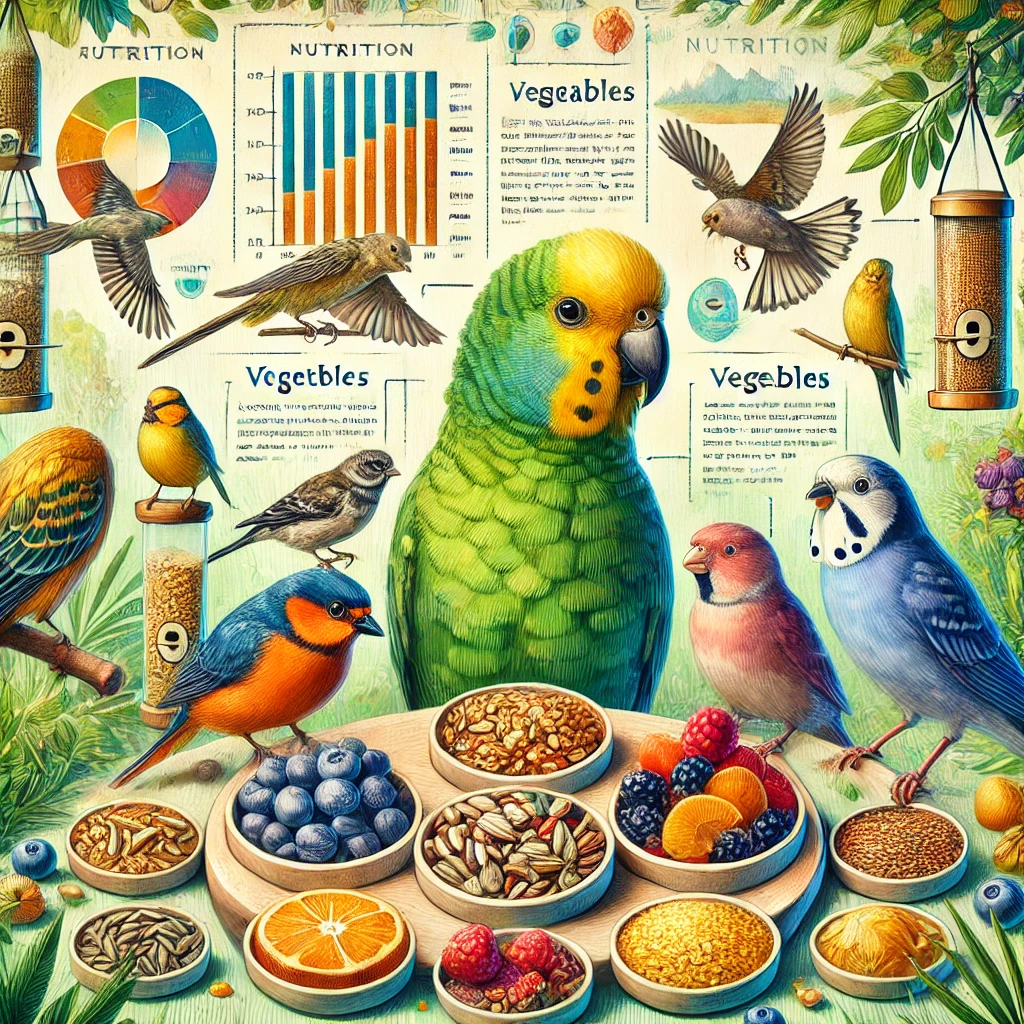A well-fed bird is a happy, healthy bird. But did you know that the dietary needs of birds can vary dramatically depending on their species? While all birds require a balance of essential nutrients, their specific needs are influenced by factors like best bird food, natural habitats, activity levels, and even life stages.
For example, seed-based diets may work for some birds, but others, like nectarivores or insectivores, need specialized foods to thrive. Consistency in feeding is key because birds have high metabolisms, and knowing how long a bird can go without food highlights the risks of irregular feeding schedules.
In this guide, we’ll explore the unique dietary needs of different bird species, the best bird food options for each, and tips to ensure your feathered companion gets the nutrition it needs.
Key Factors Influencing Bird Diets
Birds are incredibly diverse, and their dietary requirements reflect this. Understanding these factors can help you tailor a diet to your bird’s needs.
1. Species Variations
Different bird species have evolved to consume specific types of food:
- Seed-Eaters: Many parrots, finches, and canaries thrive on seeds but need additional nutrients from fruits and vegetables.
- Fruit-Eaters: Species like toucans and particular parrots require diets rich in fresh fruits.
- Insectivores: Birds like mynahs and some finches need a diet high in protein from insects.
- Nectarivores: Birds like lorikeets rely on nectar-based diets.
2. Life Stages
- Chicks: Require soft, protein-rich food for rapid growth.
- Adults: Need balanced diets to maintain energy and overall health.
- Senior Birds: May benefit from softer foods and supplements to support aging bodies.
3. Activity Levels
Active species, such as cockatiels or conures, require energy-dense food to fuel their daily activities.
4. Breeding and Molting
During breeding or molting, birds need additional nutrients, especially calcium and protein, to support egg production and feather regrowth.
Best Bird Food for Different Species
Choosing the best bird food is essential for meeting your pet’s dietary needs. Here’s a guide to some popular bird species:
1. Parrots and Parakeets
- Diet: A mix of high-quality pellets, seeds, and fresh fruits/vegetables.
- Best Options: Pellets formulated for parrots, fresh produce like carrots, apples, and leafy greens.
2. Finches and Canaries
- Diet: Small seeds, millet, and occasional greens.
- Best Options: Seed blends for finches, spinach, and small amounts of egg food.
3. Cockatiels
- Diet: A balance of pellets, seeds, and vegetables.
- Best Options: Pellets for cockatiels, broccoli, and sunflower seeds in moderation.
4. Doves and Pigeons
- Diet: Whole grains, legumes, and high-energy seeds.
- Best Options: Cracked corn, peas, and fortified pigeon food.
5. Specialized Birds
- Nectarivores: Require nectar-based diets.
- Example: Commercial nectar for lorikeets.
- Insectivores: Need high-protein foods.
- Example: Live or dried mealworms for mynahs.
Tips for Meeting Nutritional Needs
Feeding your bird isn’t just about filling a bowl. Proper nutrition requires care and variety. Here’s how to do it right:
1. Rotate Fresh Foods with Best Bird Food
While high-quality bird food provides a solid nutritional foundation, fresh foods like fruits and vegetables add variety and nutrients.
2. Monitor Portion Sizes
Overfeeding or underfeeding can lead to health issues. Stick to recommended portion sizes based on your bird’s species and size.
3. Recognize Signs of Nutritional Deficiencies
Watch for symptoms like weight loss, brittle feathers, or changes in behavior, which could indicate a lack of proper nutrition.
4. Avoid Harmful Foods
Certain foods can be toxic to birds, including:
- Avocado
- Chocolate
- Onions
- Excessive salt or sugar
FAQs on Bird Nutrition and Dietary Needs
1. How do I choose the best bird food for my pet bird?
Select a bird food that’s specifically formulated for your bird’s species. Look for fortified options that provide essential nutrients.
2. Can I feed my bird the same food every day?
No. Birds benefit from a varied diet that includes pellets, seeds, and fresh foods like fruits and vegetables.
3. Are there specific foods I should avoid for certain species?
Yes. For example, nectarines shouldn’t be given seeds, and seed-eaters don’t thrive on nectar-based diets. Research your bird’s species to understand its dietary restrictions.
4. How can I tell if my bird needs more nutrition?
Signs of poor nutrition include weight loss, dull feathers, lethargy, and changes in appetite or behavior.
5. Do all bird species need supplements in their diet?
Not necessarily. If you’re feeding your bird a balanced diet with high-quality bird food, supplements may not be needed. Consult a veterinarian if unsure.
Conclusion: The Role of Proper Nutrition in Bird Health
A bird’s diet is as unique as its personality. Understanding the specific dietary needs of your bird’s species is the key to ensuring their health and happiness. Whether it’s selecting the best bird food or supplementing with fresh produce, providing a balanced and varied diet will help your feathered friend thrive.
By paying attention to their individual needs, you can create a feeding routine that supports their energy, immunity, and longevity. After all, a well-nourished bird is a happy bird—and that’s what every pet owner wants.
Read More: Volkman Pet Products Guide




